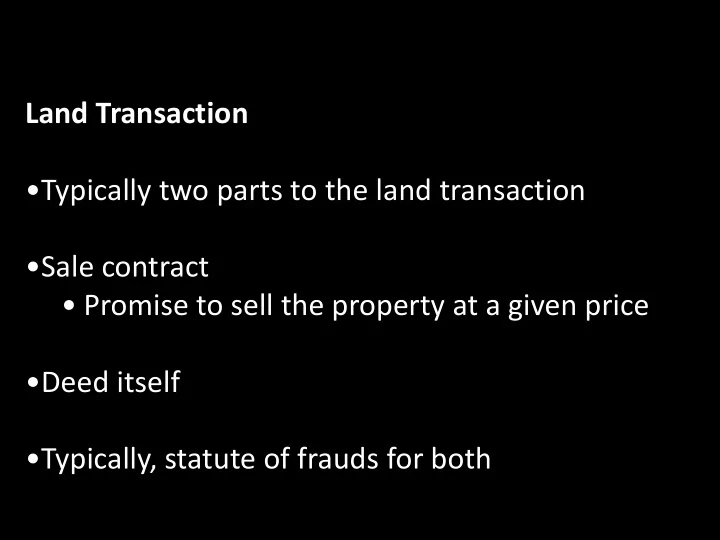

Land Transaction •Typically two parts to the land transaction •Sale contract • Promise to sell the property at a given price •Deed itself •Typically, statute of frauds for both
Harding v. Ja Laur •Mrs. Harding signs a blank piece of paper • Believes signing to straigten out boundary disputes • Alleges stapled to deed to 1517 land in Montgomery County •Why do we need a written deed? •Is this forgery? • False making • Material alteration •If allegations are true, would this be a forgery? • Different if she was tricked into signing blank sheet attached to deed?
Harding v. Ja Laur •Why does this matter for other defendants? •Bona fide purchaser, without notice • If fraud, not forgery, can Mrs. Harding void transfers to bona fide purchaser, without notice? • What if it is forgery?
Walters v. Tucker • “The West 50 feet of Lot 13 of West Tucker Helfenstein Park, a Sub- Walters division in United States Survey 1953, Twp. 45, Range 8 East, St. Louis County, Missouri,. . . .”
Walters v. Tucker • “The West 50 feet of Lot 13 of West Helfenstein Park, a Sub- Tucker division in United States Survey 1953, Walters Twp. 45, Range 8 East, St. Louis County, Missouri,. . . .”
Walters v. Tucker • Time conveyance only 450 Oak St. house • After conveyance, build Lot 13 house Tucker • Language unambiguous? Walters • Parol evidence? • Adverse Possession?
Loughran v. Kummer •Loughran – conveys property to Kummer for $1 • Gives deed to Kummer • Condition – not record until Loughran dies •Loughran, still alive, asks Kummer to tear up deed • Kummer says she does • But actually doesn’t • “wanted to ease his mind” •Control of deed when • Signed • Sealed • Delivered •Application here?
Loughran v. Kummer “To be recorded “Francis” “To be recorded upon Mrs. Craign’s upon Mrs. Craign’s death, if before me” death, if before me” • What about “take the deed to the bank to be held in escrow”? (Q.4 – p. 218)
McMurray v. Housworth •Houseworth sold 24-acre to McMurray’s •Including in deed was a “general warranty of title” clause: • Grantors agree to “defend the right and title to the above described property, unto [the grantees], their heirs, assigns, and successors in title, against the claims of all persons.” •OCRSCD has “floodwater retarding structure” easement on McMurray’s parcel
McMurray v. Housworth •Easement breach general warranty of title? •Existence of public encumbrance violate general warranty? • Public Road • Zoning • What if public encumbrance is being violated when sold? •Existence of private encumbrance violate general warranty? • Easement • Does it matter if private encumbrance is being violated? •How does notice/knowledge play a role here?
A contracts to buy from C Contract contains following clauses: • “certified to date showing good merchantable – title . . . guaranteeing said title . . . free and clear of all encumbrances” “subject, however, to all restrictions and – easements ofrecordapplying to this property “shall have sufficient time to . . . correct any – imperfections” - House subject to a restrictive covenant requiring any house erected to be two stories or higher - Current house one story - House also subject to a zoning ordinance– 3 foot setback on rear and side of property - Not currently violating
Engelhart v. Kramer
Engelhart v. Kramer “property condition disclosure statement” • “Have you experienced water penetration in the • basement ... within the past two years?” Kramer replied, “Small amt of H20 penetration in NW + NE corners [when it] rains.” “[a]re there any cracked walls or floors?” Kramer • responded “basement floor, some spots in basement walls, East bedroom walls.” Any additional problems?— “basement cement • walls have some crumbling, behind paneling, basement floor cracked [and] uneven in spots.”
Engelhart v. Kramer Under disclosure law, if “truthfully completes” • disclosure statement, no liability But must complete disclosure in “good faith” • – “an honest intention to abstain from taking any unconscientious advantage of another, even through the forms or technicalities of law, together with an absence of all information or belief of facts which would render the transaction unconscientious;” Good faith disclosure here? •
Engelhart v. Kramer No longer caveat emptor • – Previous, only liable for disclosures made Affirmative Mispresentation • – Now can be liable for non-disclosure – How change real estate deals? “as is” clauses • Still some mandatory disclosures cannot avoid • – Can you still de facto avoid them? – Some not waiveable
Brush Grocery Kart, Inc. v. Sure Fine Market, Inc. • Brush has option to buy • Exercises option • But dispute over price • During litigation—significant hail storm damage
Brush Grocery Kart, Inc. v. Sure Fine Market, Inc. 1. Equitable Conversion – slim majority • Risk solely on buyer 2. Massachusetts Rule – Risk solely on seller • Handful of states 3. Who has right of possession • Growing number of states • Including Colorado • So what is the result for Brush? •Change under either of the above theories? •Change if damage due to seller’s negligence? •Other ways to shift risk?
Recommend
More recommend